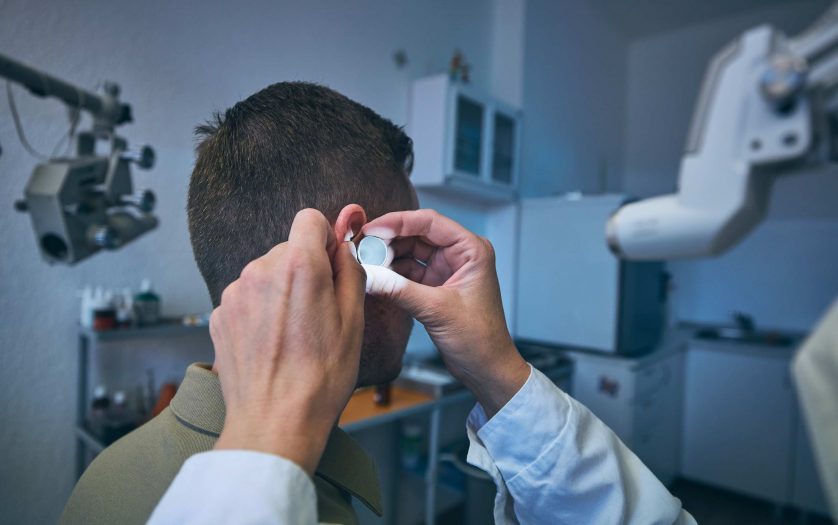
Thyroid Eye Disease (TED), also known as Graves’ orbitopathy, is an autoimmune condition affecting the eye tissue. Due to the inflammation of the fatty and muscle tissue behind the eyes, people diagnosed with TED can struggle with double vision, bulging of the eyes, eyelid swelling, increased tearing, and in some cases, loss of vision.
Thyroid Eye Disease can affect one’s ability to perform daily activities, such as working and driving, but it also affects self-confidence, well-being, and feeling comfortable in social situations. That is why Tepezza, the first FDA-approved treatment for TED, can be a huge relief for those who suffer from this condition.
However, Horizon Therapeutics USA Inc., the manufacturer of the drug, is now facing legal action from Tepezza consumers who have developed hearing impairment after treatment with the infusion.
Hearing impairment in the clinical trials
The U.S. Food and Drug Administration (FDA) approved Tepezza on January 21, 2020, after the drug was tested during clinical trials. The clinical trials conducted before Tepezza’s approval reported hearing impairment in 10 percent of the participants and stated that the symptoms were reversible upon stopping the drug.
Tepezza was tested in Study 1 and Study 2 on 84 patients, while the other 87 received a placebo. They received the infusion every 3 weeks for a total of 8 infusions, and there were no hearing impairment symptoms reported in the group that received the placebo.
The 10% of the reported reversible hearing impairment symptoms included deafness, eustachian tube dysfunction, hyperacusis, hyperacusis, and autophony.
The drug does not cure Thyroid Eye Disease but can reduce its symptoms, such as proptosis (the bulging of one or both eyes from their natural position), double vision, swelling, redness, and eye pain.
Hearing impairment risks might be higher than reported
While the initial assessments of the hearing impairment risks made by the manufacturer were not particularly alarming, and many had high hopes for the Tepezza treatment, a new study conducted by the Endocrine Society had different results.
Andrea Lora Kossler, M.D., assistant professor of ophthalmology at the Stanford University School of Medicine and senior author of the study, and her fellow researchers aimed to better understand the hearing impairment risks related to the use of Tepezza.
From the total of participants taking part in the study, up to 65% reported hearing symptoms after at least four Tepezza infusions. The percentage is way higher than what Horizon reported after the clinical trials, and it’s also alarming in terms of how long the symptoms can last. If Horizon’s Studies 1 and 2 concluded that the hearing-related symptoms are reversible after the patients no longer use Tepezza, researchers in the new study observed longer-lasting symptoms.
Participants’ most common otologic symptoms were autophony (hearing your voice unusually loud, reported in proportions of 29%) and tinnitus or ringing in the ears (27%). Other concerning symptoms were subjective hearing loss in 23% of the participants and ear plugging sensation in a proportion of 12%.
Four patients developed new or worsening sensorineural hearing loss, which is a type of hearing loss due to damage to the hair cells in the inner ear. Three other participants in the study were diagnosed with Patulous Eustachian Tube, a condition in which the channel connecting the middle ear with the back of the nose and throat stays open. In normal conditions, the eustachian tubes stay closed and open only to regulate the air pressure around the ear drum.
While more research is needed to better understand the hearing impairment risks associated with the use of Tepezza, the symptoms of some of the participants in the study did not disappear upon stopping taking the drug.
Making an informed decision
Thyroid Eye Disease is a condition that can lead to aesthetic changes to the face, disability, and mental health challenges, such as anxiety, depression, and difficulty functioning in social situations. Treatment for this eye condition should not come with the enormous cost of hearing loss, tinnitus, or other forms of hearing impairment, which can make it even more difficult to adapt and navigate the world, keep your job, or fulfilling social relationships.
Those who need to take the Tepezza infusions have to be properly informed about the possible side effects and about the fact that they may be irreversible. Furthermore, if the damage to hearing occurs during the Tepezza treatment and lasts even after the patient stops taking the infusions, we advise them to take legal action against the manufacturer of Tepezza.








